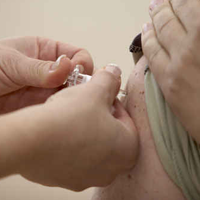Article
Reslizumab Positively Impacts the Quality of Life in Severe Asthma
Author(s):
Imagine if a study was showing such a mass amount of evidence supporting the safety of an investigational prescription for severe asthma that it had to be stopped early. It may be the best kind of problem to have.

Imagine if a study was showing such a mass amount of evidence supporting the safety of an investigational prescription for severe asthma that it had to be stopped early. It may be the best kind of problem to have.
Previous phase III trials have shown that reslizumab, an investigational IgG4/k humanized monoclonal antibody, improved lung function and reduced asthma exacerbations. Now Joshua Jacobs, MD, from Allergy and Asthma Clinical Research in Walnut Creek, California, and colleagues looked at the impact it makes on patients with severe asthma. The findings were presented in a poster session at the 2015 American College of Allergy, Asthma, and Immunology Annual Scientific Meeting (ACAAI 2015) in San Antonio, Texas.
“This [study] was 96 weeks, but it ended early because the data was overwhelming,” Jacobs told MD Magazine. However, that data was overwhelming in a good way. Originally the trial called for 900 participants but ended up with over 1,000. In addition, reslizumab continued to prove its safety throughout the months. Many patients ended early because they got what they needed to out of the medication before the endpoint.
The 1,051 patients ages 12 to 75 were diagnosed with moderate-to-severe eosinophilic asthma. Out of them, 480 were reslizumab-naïve and 571 were reslizumab-experienced. All of the participants received reslizumab 3.0 mg/kg every four weeks and answered the 60-question Asthma Quality of Life Questionnaire (AQLQ) every 24 weeks which focused on symptoms, activity limitation, emotional function, and environmental stimuli. When answering the questions, the patients were asked to think back to events over the past two weeks and rate experiences with seven being no impairment to one being severe impairment.
“The higher the score the better you feel, the lower the score the worse you feel,” Jacobs clarified.
Demographics and asthma characteristics were similar between the reslizumab-naïve and —experienced groups. As described earlier, many patients started trickling off the study between 72 and 96 weeks because they reached desired outcomes.
Baseline AQLQ was 5.16 in the naïve group and 5.49 in the experienced group. The experienced patients maintained their baseline scores over the course of study with a slight improvement of 0.310 after 96 weeks. The naïve group, however, showed a 0.395 AQLQ score improvement by 24 weeks — the first check-in point. The numbers became significant after 96 weeks with a 0.540 score.
“These were clinically important outcomes,” Jacobs said, although he personally thought that the difference would be larger.
The improved AQLQ scores were sustained for up to two years with the reslizumab 3.0 mg/kg every four weeks in the experienced group. However, naïve patients only showed better AQLQ scores while they were actually in the treatment period. These findings add to previous research showing the benefits of reslizumab in patients with asthma.



